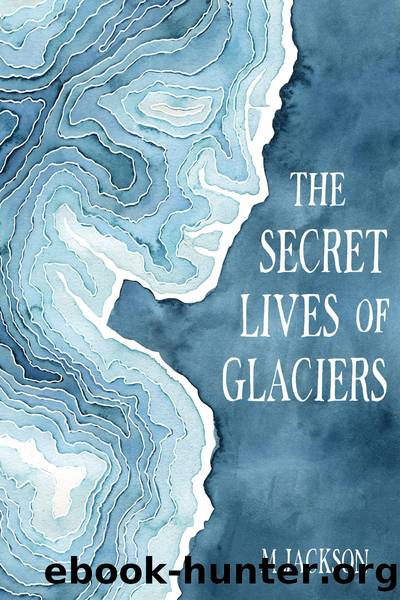The Secret Lives of Glaciers by M Jackson

Author:M Jackson
Language: eng
Format: epub
Publisher: Green Writers Press
Published: 2019-12-15T00:00:00+00:00
A LAST POINT TO CONSIDER, but important.
I also suspect one additional variable is occurring that influences how people perceive glacier change in this area.
Glacier changeâand climate change more broadlyâis regularly narrated (talked about) in a reductionist way that reduces all the potential futures out there down to a single futureâone that is certainly negative and ice-free. Youâve heard those stories: we are losing our ice and by such and such year, a particular place on this planet will no longer have glaciers. Iâve written many of those stories over the years.
Hereâs the problem. An ice-free Iceland of the future would be a hard place to survive for Icelanders. Any place that has ice today would be a hard place to be without ice. Glaciers are critical to local ecosystems. It is terrifying to think about a future that has no ice. And as such, the sheer âunsurvivabilityâ of an ice-free Iceland might to some render that future unthinkable.
We simply choose not to think about it.
A local artist, Rúnar, phrased it best when he said: âMy bronze sculpture will be there longer than the glacier ⦠sadly I think that they are going to disappear, and it is also unthinkable.â
I think that the unthinkability of loss plays a strong part in answering why some Icelanders produce, and cling to, contrary narratives of glacier change. It is easier to make a different story of what is happening than to take a hard look at what is quite unthinkable.
Unthinkability as a social phenomenon has not been treated much within climate change scholarship, but it has been a focus within studies of war, genocide, and international relations. But to talk about glaciers, we also need to talk about war. Bear with me one momentâthis is important.
Timur Kuran, an economist from Duke University, explained that unthinkable thoughts are thoughts one cannot admit having or entertaining âwithout raising doubts about oneâs civility, morality, loyalty, practicality, or sanity.â136 To this list I suggest adding survivability. How may we speak of our own personal inability to survive without questioning our sanity? For example, those who entertain notions of suicide are regularly directed to mental health services. Self-harm for some is unthinkableâand thinking thoughts of self-harm are strong signs that something is amiss. Mental health professionals do not want people to have such thoughts.
Or, to use a different example: it is unthinkable that I, or you, would willingly commit genocide. Kuran, again: âAn unthought belief is an idea that is not even entertained.â136 In this theorization, unthinkability is an emotional concept. To Ari, glacier change is unthinkable because a world without ice is too horrible to considerâtherefore, he can skip over the present and discuss his certainty that the ice will return.
Unthinkability is not necessarily synonymous with improbability; for example, as political scientist Jennifer Mitzen observes, when countries label nuclear war âunthinkable,â the concept is deployed to suggest that while the likelihood of unleashing nuclear weapons is probable, it is too horrible to consider.137 Unthinkable thoughts are also those that are ontologically not possible.
Download
This site does not store any files on its server. We only index and link to content provided by other sites. Please contact the content providers to delete copyright contents if any and email us, we'll remove relevant links or contents immediately.
Barron's AP Biology by Goldberg M.S. Deborah T(4148)
Aliens by Jim Al-Khalili(2827)
MCAT Physics and Math Review 2019-2020 by Kaplan Test Prep(1811)
Cracking the AP Physics C Exam, 2018 Edition by Princeton Review(1720)
The Two Cultures by C. P. Snow(1297)
Biology For Dummies by Fester Kratz Rene(1269)
Biology For Dummies (For Dummies (Math & Science)) by Rene Fester Kratz(1267)
500 AP Chemistry Questions to Know by Test Day(1249)
Cracking the AP Chemistry Exam, 2012 Edition by Princeton Review(1230)
MCAT Organic Chemistry Review 2019-2020 by Kaplan Test Prep(1226)
MCAT General Chemistry Review 2019-2020 by Kaplan Test Prep(1190)
McGraw-Hill Education Preparation for the GED Test by McGraw-Hill Education Editors(1177)
Cracking the AP Physics 2 Exam, 2018 Edition by Princeton Review(1158)
Cracking the AP Chemistry Exam, 2018 Edition by Princeton Review(1137)
Aliens: The World's Leading Scientists on the Search for Extraterrestrial Life by Jim Al-Khalili(1128)
500 AP Chemistry Questions to Know by Test Day by Mina Lebitz(1092)
McGraw-Hill Education SAT Subject Test Biology by Stephanie Zinn(1080)
Chemistry Essentials For Dummies by John T. Moore(1069)
Cracking the AP Environmental Science Exam, 2018 Edition by Princeton Review(1056)
